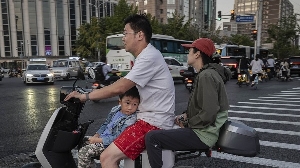China is one of the most expensive places in the world to raise a child in relative terms, a new report says, with the disproportionate impact on women driving the country’s precipitously low fertility rate as it grapples with a demographic crisis.
The study, released Wednesday by the China-based YuWa Population Research Institute, found the average nationwide cost of raising a child from birth to age 17 was about $74,800 – rising to more than $94,500 to support a child through a bachelor’s degree.
The cost of raising a child to age 18 in China is 6.3 times higher than the country’s GDP per capita, the report said – a ratio second only to its East Asian neighbor South Korea, which has the world’s lowest fertility rate, and where the cost of child-rearing is 7.79 times GDP per capita.
For comparison, the report said that cost is just 2.08 times the GDP per capita in Australia, 2.24 times in France, 4.11 times in the United States, and 4.26 times in Japan – another East Asian country that has long struggled with a rapidly aging population and declining birth rate.
“Due to reasons such as the high cost of childbearing and the difficulty for women to balance family and work, the Chinese people’s willingness to have children is almost the lowest in the world,” the report said. “It is no exaggeration to describe the current population situation as a collapse in the birth population.”
Citing a 2018 paper, the report said this means women lose nearly five hours daily of leisure and paid work time – with almost all those hours devoted to housework instead. While fathers lose some leisure time too, their paid work hours don’t change significantly – and their careers aren’t significantly impacted, the YuWa report said.
“Because the current social environment in China is not conducive to women’s childbirth, the time cost and opportunity cost for women to have children are too high,” the report said. “Some women have to give up having children in exchange for the opportunity to succeed in their careers.”
China’s economy grew 5.2% in 2023, slightly better than an official target set by Beijing. But the country is facing a myriad of challenges, including a record property downturn, surging youth unemployment, deflationary pressure, rising corporate defaults and mounting financial stress at local governments.
The report warned that the falling birthrate could deeply impact economic growth, people’s overall happiness and China’s global standing.
The authors urged national policies to reduce the cost of childbirth “as soon as possible” – such as cash, tax and housing subsidies, equal maternity and paternity leave, protecting the reproductive rights of single women, and educational reform.
Business News of Thursday, 22 February 2024
Source: edition.cnn.com
China is one of world's most expensive places to raise children - Report
 The cost of raising a child to age 18 in China is 6.3 times higher than the country’s GDP per capita
The cost of raising a child to age 18 in China is 6.3 times higher than the country’s GDP per capita












